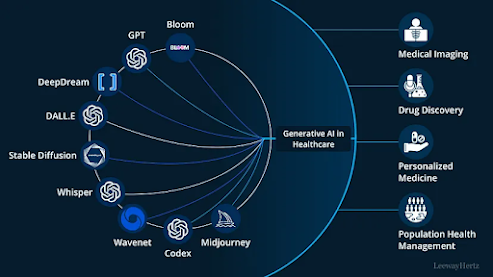The field of healthcare has experienced a significant transformation with the advent of advanced technologies like Generative Artificial Intelligence (AI). Generative AI utilizes machine learning algorithms to create new data, images, and text based on patterns and existing information. In healthcare, this cutting-edge technology has proven to be a game-changer, revolutionizing various aspects of medical practice and research. In this article, we will explore ten compelling use cases of Generative AI in healthcare, highlighting its potential to enhance patient care, diagnosis, treatment, and medical advancements.
1. Medical Imaging Enhancement
Generative AI algorithms are employed to enhance the quality of medical images, making them clearer and more accurate. This technology can reduce image noise, enhance contrast, and reconstruct missing or degraded portions, aiding radiologists and other healthcare professionals in making more precise diagnoses.
2. Synthetic Data Generation
Training machine learning models often requires large datasets, but acquiring such datasets with sensitive medical information can be challenging due to privacy concerns. Generative AI allows the generation of synthetic medical data that retains the statistical characteristics of real data, enabling researchers to develop and validate models without compromising patient privacy.
3. Drug Discovery
The drug discovery process is time-consuming and costly. Generative AI can significantly speed up this process by predicting molecular structures that could be potential candidates for new drugs. It simulates chemical reactions and interactions, suggesting novel compounds for further testing and development.
4. Personalized Treatment Plans
Generative AI can analyze a patient's medical history, genetic makeup, and other relevant factors to generate personalized treatment plans. These plans take into account individual variations, improving the efficacy of treatment and reducing adverse effects.
5. Medical Text Generation
Generating accurate and comprehensive medical reports can be a time-consuming task for healthcare providers. Generative AI can assist in automatically generating medical notes, summaries, and patient reports, enabling doctors to spend more time on direct patient care.
6. Disease Progression Prediction
By analyzing patient data over time, Generative AI can predict disease progression and potential complications. This early warning system allows healthcare professionals to intervene proactively, leading to better patient outcomes and reduced hospitalization rates.
7. Surgical Simulation and Training
Generative AI is used to create realistic surgical simulations, providing medical students and surgeons with a safe environment to practice complex procedures. This technology helps improve surgical skills and fosters innovative techniques, ultimately enhancing patient safety during real operations.
8. Mental Health Diagnosis and Treatment
Generative AI can be employed to analyze patient data, including speech patterns and behavior, to assist in diagnosing mental health conditions. Moreover, it can generate personalized therapy interventions and support tools to aid in the treatment of various mental health disorders.
9. Prosthetics and Assistive Devices
Generative AI plays a crucial role in designing and customizing prosthetics and assistive devices to better suit individual patients. By analyzing biomechanical data and patient preferences, these devices can be optimized for comfort, functionality, and aesthetics.
10. Radiology Report Generation
Interpreting complex radiological images and generating comprehensive reports is demanding for radiologists. Generative AI can automatically analyze medical images and produce structured and standardized radiology reports, facilitating more efficient communication among healthcare teams.
Conclusion
Generative AI has opened up a world of possibilities in healthcare, revolutionizing medical practice, research, and patient care. From improving medical imaging and drug discovery to enhancing surgical training and mental health treatment, the impact of this technology is profound and promising. As Generative AI continues to evolve, it will undoubtedly play an increasingly critical role in shaping the future of healthcare, leading to better diagnoses, more effective treatments, and improved patient outcomes. Nonetheless, it is essential to ensure ethical considerations, data privacy, and regulatory compliance while harnessing the full potential of Generative AI in healthcare domain.



No comments:
Post a Comment